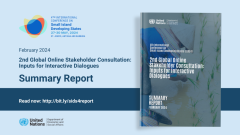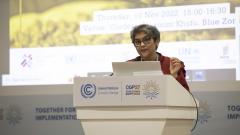- عربي
- 中文
- English
- Français
- Русский
- Español
Japan Leads the Way in Helping World's Poorest

By Mr. Anwarul Karim Chowdhury, High Representative for the Least Developed Countries, Landlocked Developing Countries and Small Island Developing States
Japan, a major development partner to the world’s neediest countries, has been very active in advancing their cause on the global development agenda. She has taken forward-looking positions at various global forums to ensure the qualitative impact of her development support.
A significant manifestation of this was the organization, in collaboration with the United Nations and Columbia University, of a substantive exchange in June last year in New York on the Global Development Agenda and the United Nations Reform.
The symposium focussed on how to effectively address the development needs of the most vulnerable countries of the world – the Least Developed Countries (LDCs), the Landlocked Developing Countries (LLDCs) and Small Island Developing States (SIDS). I still recall the wonderful elaboration that Nobel laureate Professor Joseph Stiglitz presented as the raison d’etre for the international community to stand by these countries in the true spirit of partnership.
More recently, the Director-General for multilateral development cooperation of Japan’s Foreign Ministry, Ambassador Kaoru Ishakawa, made a keynote presentation at a symposium held at the United Nations late last month on agriculture and rural development and what Japan can provide. Ambassador Ishakawa elaborated on Japan’s strategy for promoting economic development in developing countries, the most deserving of which are the world’s 50 LDCs.
The simple but well-thought out strategy identifies three steps for achieving economic development: ”produce+sell+buy”. It focuses on Japan’s foreign assistance through the prism of these three steps. The starting point of this strategy, Ambassador Ishikawa explained, is the conviction that the people in the developing countries have the vision and the eagerness to take their destiny into their own hands, assuming the primary responsibility of their own development.
In my many field trips to the LDCs that is what I invariably find. I have found that the ordinary people, more so the women, are keen to work for the betterment of their lives, those of their children and of the future generations. Japan’s foreign assistance strategy would focus on supporting the needy countries at each of the three steps required for sustainable development.
Japan’s strategy is in line with the Programme of Action for the Least Developed Countries for the Decade 2001 – 2010 (commonly known as the Brussels Programme) adopted by the Third United Nations Conference on the Least Developed Countries held in Brussels in May 2001. The Programme identifies trade (sell+buy) as a major force in advancing economic growth, poverty reduction and sustainable development and calls for “building productive capacities” (produce) to make globalisation work for LDCs. It also recognises that the primary responsibility for development lies with the LDCs themselves (national ownership).
However, because of limited financial resources as well as weak institutional and technical capacities, the LDCs are not able to implement this seemingly simple and obvious approach to development without the support of the international community, and that is where initiatives such as Japan’s become significant.
To paint a statistical picture of the enormity of the constraints facing the LDCs, these 50 countries, with nearly 12 percent of the world’s population, account for only 0.7 percent of world’s exports. When oil exports are excluded (five LDCs have significant reserves), the figure shrinks to 0.3 percent. What these figures say is that the scale of the constraints facing the LDCs is such that they cannot effectively engage in the produce, sell and buy steps that would promote economic development.
The good news is that since the adoption of the Brussels Programme, which is premised on national ownership by LDCs and partnerships with other development actors, the international community is paying ever greater attention to these challenges faced by the LDCs. On the “buy” side, for instance, we have such initiatives as the European Union’s Everything But Arms (EBA); the United States’ Africa Growth and Opportunity Act (AGOA) and of course, Japan’s own near-total duty-free and quota-free market access for products originating from the LDCs. As most LDCs have been unable to take full advantage of these opportunities due to supply-side constraints, the concept of “aid for trade” has emerged as a major strategy to address the challenges in the “produce” and “sell” steps of the equation. Aid for trade initiatives range from assistance in production of exportable goods, packaging, standardisation and marketing; building physical infrastructure like roads, railways, port facilities and communication networks; to providing technical assistance in trade policy matters.
It is instructive that during the Doha Round of trade negotiations, which has unfortunately floundered, countries had been able to agree on a broad, if not perfect, trade package for LDCs aimed at addressing challenges at the produce, sell and buy steps. Unfortunately, this trade package risks going down the drain along with the Doha Round. This would be most unfortunate, as it would deprive LDCs of the much-needed opportunity to expand their export trade, a prerequisite for poverty reduction and economic growth. In this respect, Japan’s commitment to push ahead with its produce+sell+buy initiative, despite the present collapse of the trade talks, is a big relief and must be lauded. Other countries should follow Japan’s example and unilaterally commit themselves to implementing, and even going beyond, the trade package for LDCs that was agreed in Hong Kong last December.
While trade can play a bigger role in generating resources to finance sustained growth and sustainable development in the LDCs, the importance of official development assistance (ODA) cannot be ignored. Equally important is the need for ensuring effectiveness of development aid for the LDCs. At the same time, efforts to relieve LDCs of their crushing debt burden also need to be accelerated. Without quick and full delivery on these commitments, neither the goals of the Brussels Programme nor the Millennium Development Goals shall be achieved in the LDCs.
This September, the General Assembly of the United Nations will hold a high-level meeting in New York to undertake a five-year comprehensive global review of the implementation of the Brussels Programme. As a major friend of the LDCs, Japan’s active engagement at the high level meeting would be a substantive contribution towards a successful outcome. As Ambassador Ishakawa stated at the symposium in New York, assistance to the LDCs should not be seen as charity, but as a vote of confidence in their ownership and the aspirations of the ordinary people of those countries to improve their lives.
30 August 2006





